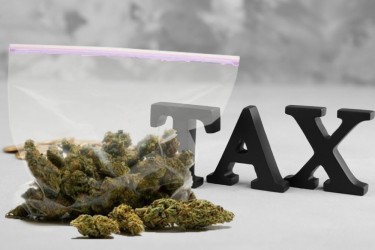
In a move that has sparked significant controversy within the cannabis industry and among reform advocates, Republican Senators James Lankford (Oklahoma) and Pete Ricketts (Nebraska) have introduced a bill that seeks to permanently enforce the tax penalties imposed on cannabis businesses under Section 280E of the Internal Revenue Code. The legislation, titled the “No Deductions for Marijuana Businesses Act,” was filed on February 7, 2025, and aims to ensure that marijuana operators remain unable to deduct standard business expenses, even if marijuana is rescheduled under federal law.
The proposal comes at a time when cannabis reform advocates have been pushing for fairer tax policies and greater federal recognition of the legal cannabis industry. However, this bill represents a significant obstacle to those efforts, as it would effectively maintain one of the most burdensome financial restrictions on cannabis businesses indefinitely. This article explores the implications of the proposed legislation, its potential impact on the cannabis industry, and the broader context of federal marijuana policy reform.
What Is Section 280E?
Section 280E of the Internal Revenue Code is a decades-old provision that has long been a thorn in the side of legal cannabis operators. Enacted in 1982 during the height of the War on Drugs, Section 280E prevents businesses involved in trafficking Schedule I or II controlled substances from deducting ordinary and necessary business expenses from their taxable income. This includes expenses such as rent, payroll, utilities, advertising, and other operational costs.
The provision was originally designed to target illegal drug dealers but has since been applied to state-legal cannabis businesses due to marijuana’s classification as a Schedule I drug under the Controlled Substances Act (CSA). As a result, cannabis operators are subject to significantly higher effective tax rates compared to businesses in other industries. In some cases, these tax rates can reach as high as 70% to 90%, leaving many cannabis companies struggling to stay afloat despite generating substantial revenue.
For years, cannabis advocates have argued that Section 280E is outdated and unfairly penalizes businesses that operate legally under state laws. They contend that removing or modifying this provision would allow cannabis companies to reinvest in their operations, create jobs, and contribute more effectively to local economies.
The “No Deductions for Marijuana Businesses Act”
The bill introduced by Senators Lankford and Ricketts seeks to cement Section 280E’s application to cannabis businesses permanently. Specifically, it would ensure that even if marijuana is rescheduled from its current classification as a Schedule I drug—something reform advocates have been pushing for—cannabis operators would still be barred from deducting standard business expenses.
In a statement accompanying the bill’s introduction, Senator Lankford said:
”Marijuana doesn’t make our families stronger, our streets safer, or our workplaces more productive. Businesses that sell federally illegal drugs—including marijuana businesses—shouldn’t get federal tax breaks.”
Senator Ricketts echoed this sentiment, emphasizing his opposition to what he described as efforts to “normalize” marijuana use:
”We cannot allow federal tax policy to subsidize an industry that poses serious risks to public health and safety.”
The bill reflects a broader ideological stance among certain Republican lawmakers who remain staunchly opposed to cannabis legalization at both the state and federal levels. By targeting one of the key financial incentives for rescheduling or descheduling marijuana—namely, relief from Section 280E’s tax penalties—the legislation seeks to undermine efforts to legitimize the industry.
Implications for Cannabis Businesses
If enacted, the “No Deductions for Marijuana Businesses Act” would deal a significant blow to cannabis operators already grappling with high taxes and regulatory challenges. Many in the industry were hopeful that rescheduling marijuana—such as moving it from Schedule I to Schedule III under the CSA—would alleviate some of these burdens by rendering Section 280E inapplicable. However, this bill would ensure that those hopes are dashed.
Financial Strain on Operators
The inability to deduct ordinary business expenses means that cannabis companies are taxed on their gross income rather than their net income. This creates an unsustainable financial model for many operators, particularly small and medium-sized businesses that lack access to traditional banking services or capital due to federal prohibition.
For example:
A dispensary with $1 million in revenue might incur $800,000 in operating expenses. Under normal tax rules, it would pay taxes on $200,000 in profit. However, because of Section 280E, it must pay taxes on the full $1 million in revenue. With effective tax rates often exceeding 70%, this leaves little room for reinvestment or growth—and in some cases leads to insolvency.
By keeping these restrictions permanently intact, Lankford and Ricketts’ bill could exacerbate existing disparities within the industry. Larger multi-state operators (MSOs) with significant resources may be able to weather these challenges better than smaller independent businesses or social equity applicants seeking entry into the market.
Impact on State-Legal Markets
The financial strain imposed by Section 280E also has broader implications for state-legal cannabis markets. High taxes and operating costs make it difficult for legal businesses to compete with illicit operators who do not face similar financial constraints. This undermines one of the primary goals of legalization: reducing the size of the illegal market.
According to Beau Whitney, Chief Economist at Whitney Economics:
”Maintaining 280E restrictions will only perpetuate an uneven playing field where illicit operators thrive while legal businesses struggle.”
States that rely on tax revenue from legal cannabis sales could also feel the impact. If legal operators are forced out of business due to unsustainable tax policies, states could see declines in revenue earmarked for education, healthcare, infrastructure projects, and other public services funded by cannabis taxes.
Opposition From Advocates and Industry Leaders
The introduction of this bill has drawn sharp criticism from cannabis advocates and industry leaders who view it as a regressive step that ignores both economic realities and shifting public opinion on marijuana legalization.
Advocacy Groups Speak Out
Organizations such as the National Cannabis Industry Association (NCIA) and Marijuana Policy Project (MPP) have condemned Lankford and Ricketts’ proposal. In a statement released shortly after the bill’s introduction, NCIA Executive Director Aaron Smith said:
”This legislation represents an outdated approach rooted in stigma rather than science or common sense. It unfairly targets an industry that Is creating jobs, generating tax revenue, and providing safe access for millions of Americans.”
Similarly, MPP’s Deputy Director Matthew Schweich argued:
”Punitive tax policies like 280E only serve to bolster the illicit market while undermining legitimate businesses trying to operate within state laws.”
Industry Leaders React
Cannabis business owners have also voiced their concerns about how this legislation could impact their operations. Many argue that fair tax treatment is essential not only for their survival but also for fostering innovation and competition within the industry.
Kim Rivers, CEO of Trulieve Cannabis Corp., stated: ”The legal cannabis industry has proven its value time and again through job creation and community investment. Policies like this threaten all of that progress.”
Broader Context: Federal Rescheduling Efforts
The timing of this bill is particularly notable given ongoing discussions about rescheduling marijuana at the federal level. In late 2023, President Joe Biden directed federal agencies—including the Department of Health and Human Services (HHS) and Drug Enforcement Administration (DEA)—to review marijuana’s classification under the CSA. HHS subsequently recommended moving marijuana from Schedule I (the most restrictive category) to Schedule III.
Rescheduling marijuana would represent a significant shift in federal policy by acknowledging its medical value while reducing some regulatory barriers. However, it would not legalize marijuana outright or address issues like banking access or interstate commerce.
Advocates had hoped that rescheduling would also eliminate Section 280E’s application to cannabis businesses—a key incentive for reform efforts. By introducing legislation specifically designed to preserve these tax penalties regardless of rescheduling outcomes, Lankford and Ricketts are effectively preempting one of the potential benefits of reform.
Conclusion
The “No Deductions for Marijuana Businesses Act” introduced by Senators James Lankford and Pete Ricketts represents a significant challenge for advocates seeking fairer treatment for legal cannabis operators under federal law. By aiming to keep Section 280E’s tax penalties permanently intact—even if marijuana is rescheduled—the bill threatens to undermine progress toward legitimizing an industry that has already faced numerous obstacles. While proponents argue that such measures are necessary to prevent “subsidizing” an industry they oppose on moral grounds, critics contend that maintaining punitive tax policies will only harm legitimate businesses while empowering illicit markets.
As debates over federal marijuana policy continue—including discussions around rescheduling—it remains crucial for stakeholders within the cannabis industry to mobilize against regressive measures like this one. The future of America’s rapidly evolving relationship with cannabis hangs in the balance—and decisions made now will shape its trajectory for years to come.







